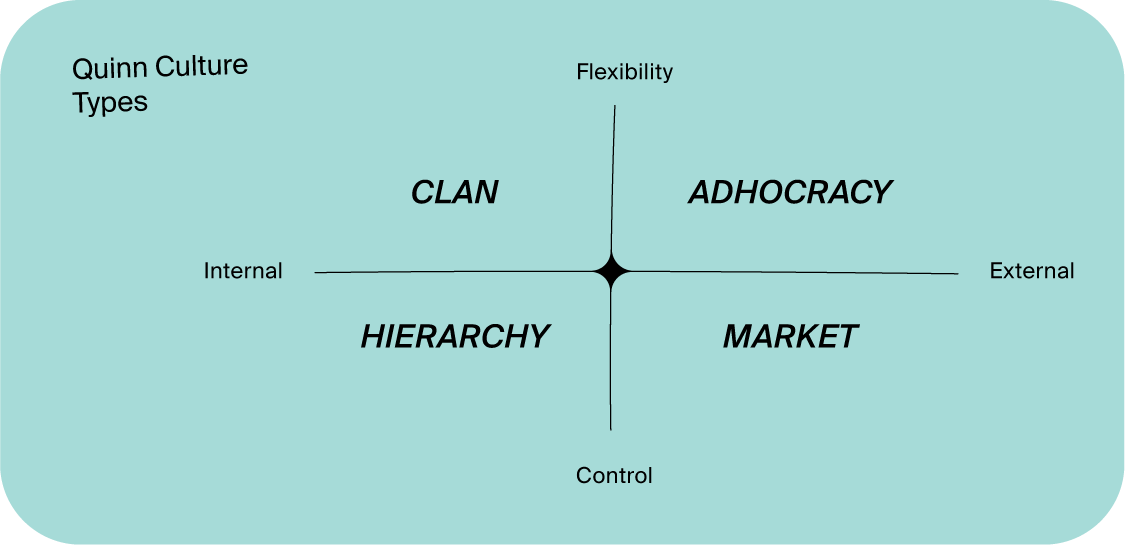Does your workplace rock or has it hit rock bottom? If you asked your teams to describe the culture at your organization, would they say it’s awesome and vibing, or lousy and draining?
These words matter and carry more weight than you can imagine. Because the way your people feel at work, directly impacts and creates the workplace culture of your business. And this vibe flows onto your customers and your bottom line. That’s why it literally pays to put an effort into building a positive workplace culture.
If you’re wondering how your business stands on the culture front, or if you know you’re not in a good place and want to improve it, this article might help get you on the right track. We explain what organizational culture is, why it’s important, how it affects your business, and what you can do right now to fix it.
First: Learn 4 core types of organizational culture
If someone asked you to describe the type of culture at your organization would you know what to say? Does your team work as a clan, an adhocracy, a hierarchy or do you function with a market mentality?
To help you work out where you stand, we explain these four core types of organizational culture, which were developed by business professors Robert E. Quinn and Kim Cameron.

Clan culture: Collaboration and family
Clan cultures are homey workplaces where colleagues and their leaders treat each other and their work like family. They are also known as collaborative cultures because they encourage teamwork and are driven by the idea that everyone's voice is heard and valued.
Because of their horizontal management structure, these kinds of teams are not micromanaged and work autonomously.
This type of clan culture is easiest to apply in small companies and startups. While elements of this collaborative company culture can be incorporated in larger organizations, it can be hard to achieve full scale because of the size and complexity when larger numbers of people are involved.
Pros of clan cultures include:
High team or employee engagement and strong relationships amongst coworkers with an open communication ethic where leaders are viewed as mentors.
Focus on employee's well being which usually outcomes to high employee satisfaction.
Happy and low stress work environment which can drive market growth with its optimistic energy.
Often perceived as inclusive workplace culture where employees feel heard
Potential downsides of implementing clan culture:
Too much collaboration can sometimes lead to lower productivity, lack of accountability and resistance to change.
Because leaders are seen as part of the team, the limited authority approach they take can make it difficult to make tough decisions that are good for business, but might hurt the feelings of team members.
Adhocracy culture: Innovation and entrepreneurship
Adhocratic cultures are fast-paced workplaces where new things are born and risks are taken. They are also referred to as creative cultures because they are based on principles of innovation and entrepreneurship.
These types of companies function with a decentralized leadership structure where the focus on hierarchy and formal procedures is limited or almost non-existent. That’s what allows them to make decisions quickly and adjust to market and customer needs rapidly.
Most tech companies and startups adopt this creative and positive culture type, which encourages idea generation. No matter how crazy it might sound, employees are encouraged to break boundaries and experiment, which creates a high personal and professional growth environment.
Pros of adhocracy cultures are:
The encouragement around experimentation creates psychological safety and freedom around the expression of ideas generates continual growth throughout teams.
While it can be risky and come with a high cost for failed ideas, the focus on innovation increases the team’s chance of coming up with market-leading products and services that differentiate and lead within their industry.
Usually perceived as positive work environment with company's core values well defined
Cons, on the other hand, are also present:
The fast-paced nature of innovation can make it a chaotic and high stress environment which doesn’t gel well with routine-based individuals.
Lack of set structure and business goals can make it hard for everyone to stay on the same page.
Hierarchy culture: Control and centralize
Hierarchical cultures are rigid workplaces where control, processes, and centralization reign supreme. They are also known as control cultures because of their concentration on stability, results, and reliability.
Organizations with hierarchical cultures have a clearly defined management structure at every level, with strict oversight and accountability of the teams they lead. Unlike creative and collaborative cultures where openness and freethinking are encouraged, control cultures like and live by rules and processes. This is why you’ll find most government organizations and finances and insurance companies continue to live by this model.
Pros of hierarchy culture:
Clearly defined role responsibilities and expectations make it easier to manage work and team members, as well as hold the right people accountable.
The order and routinely structured nature of the entire organization makes it easier for team members to understand the role they play in achieving business goals.
Potential cons you might face with hierarchy culture:
Limited scope for creative thinking and the inability to do more than just your predefined role can make it a lackluster and stagnating work environment.
An impersonal approach to leading a team, where the sole focus is on business priorities rather than people, can lower employee morale and the effort they put into their work.
It can feel like corporate culture which isn't always what you'd want
Market culture: Competition and achievement
Market cultures are competitive workplaces where employees and leaders are driven by results, sales, and profits. They are also known as competitive cultures because everything revolves around the win in these types of organizations.
Companies that live the market culture generally have ambitious, strong leaders who inspire their equally ambitious employees to deliver results. While it may seem like the management structure of market cultures is hierarchical and controlling, sometimes it can be more of a partnership where leaders work hard to help keep their teams motivated to achieve.
This is why you’ll find the market culture in most sales teams and businesses with a high customer focus. Many creative agencies also adopt this model because they need to keep their client’s happiness as their number one priority.
Market culture organizational culture pros:
The competitive nature usually transfers to high productivity and profitability where many businesses not only meet, but exceed set targets.
Because of the high focus on customer or client satisfaction, it can also produce continuous and regular product or service improvements where you constantly work to give your target market what they need and want.
Usually perceived as culture that stimulates professional development
Market culture potential cons:
Highly competitive employees and even more competitive leaders can lead the business to create a toxic work environment that undermines all other factors, including employee health.
The intensity of competition can cause some employees to burnout and even take legal action against the organization which will not only damage brand reputation but also incur costs.
Why Organizational Culture is Important
Organizational culture is important because it affects every aspect of your business and brand. It impacts your customers and people’s connection to your business, its growth and overall brand advocacy. All three are interdependent. So, doing well in one will produce flow-on effects in the others.
Because company culture is an overarching concept, it hits every corner of your business. It’s visible and feelable inside the workplace, and heard and talked about outside of it – from the way your employees do their job and service customers, to the types of candidates you attract as an employer. Your organizational culture follows you around like a shadow.
That’s why companies and business leaders need to play an active role in shaping, defining, and living it.
Connection
When we talk about connection, we’re not just talking about the development and nurturing of quality relationships amongst team members and having friends at work (which is a good indicator of good company culture).
We’re talking about the broader concept of connecting with the business. Great company cultures have teams that have a deep-seated understanding and belief in the business’s purpose, product and their customers. It’s this genuine care factor and shared company values that makes the difference.
Organizations with great workplace cultures generally have more people with higher levels of business engagement and alignment, which Bert Bean, Forbes Council Member and CEO of Insight Global says is what every CEO seeks.
This is because these connections go beyond merely showing up to work and ticking a few items off their to-do list. These highly engaged employees build deeper, more meaningful relationships with immediate teams, external stakeholders and customers, because they are working to create something they believe in at a personal level, not just professionally.
Business Performance & Customer Centricity
Your business performance is driven by your people. The more productive, innovative, engaged, persistent and dedicated your team is, the greater your bottom line will be. If you’re lucky enough to attract employees who are passionate about your business purpose, like the ones we talked about in the previous section, you’re on a good path to high profits and a growing customer base.
So how does company culture impact your business performance? Well, positive workplace cultures have more employee engagement. According to Gallup engaged employees are more knowledgeable and attentive, and they are willing to go the extra mile to create wow moments which keep their customers coming back.
But on top of that, another Gallup report found that creating a strong company culture of engagement brings several business benefits including:
- 10% higher customer loyalty
- 23% higher profitability
- 18% higher productivity
Brand Advocacy
Brand advocacy can come from two avenues: your employees and your customers. Great workplace cultures tend to reap the benefits of both. When you have a healthy workplace culture, you have a happy team that genuinely cares and wants to help customers with their needs. This will have a flow-on effect on your customers who will spread good words of praise, willingly.
When you build out a positive organizational culture, advocacy will evolve naturally, and over time, it will build a strong brand for your business. Strong brands deliver three things:
- A positive company reputation
- High customer retention
- Low employee turnover
5 things you can start doing today to create a positive organizational culture
Work culture and behaviors travel from top down. This means people leaders and managers play a pivotal and vital role in driving change and transformation within the organization. If you want employees to act a certain way, as a leader, you need to live and display those behaviors yourself in daily interactions.
So to create a positive workplace culture or organizational culture, it’s less about making big changes and more about making small, but consistent adjustments in the way you work and build relationships.
There are five things you can start working on and incorporating into your daily routines with your teams: instill trust, embrace engagement, adopt open communication, cultivate collaboration, and foster growth and flexibility.
Instill Trust
Employees at high-trust companies are 50% more productive and have 106% more energy at work than those at low-trust companies. So, instilling trust is one of the first and best strategies for long-term success to create and maintain a positive work culture.
There are five behaviors people leaders can use to build trust:
- Acknowledgment – Recognize excellence in the moment and with the whole team.
- Motivation – Assign challenging but achievable goals.
- Autonomy – Give employees the freedom to choose how they work.
- Relationships – Promote and endorse socializing and team-building activities.
- Emotional intelligence – Show and share your vulnerable side as a leader.
Embrace Employee Engagement
Engagement and positive company culture go hand-in-hand. Research by Gallup shows that while engaged employees are enthusiastic and involved, disengaged employees are disgruntled and disloyal. With 70% of team engagement determined solely by the manager, people leaders are held most responsible for these figures.
The three key drivers of employee engagement for leaders are:
- Purpose – Be clear on expectations and show how the work your people do supports company strategy.
- Care – Show you genuinely care and value them by recognizing achievement at individual and team level.
- Continuous conversations – Have regular check-ins and listen to expressed and unexpressed needs.
Open Communication
Clear and effective communication is a must. But what you want is an open communication policy. One that cultivates and values honesty and doesn’t shy away from difficult conversations.
Three things you can do to form an open communication culture are:
Foster psychological safety – Endorse and encourage communication where everyone feels safe to speak up.
Seek and act on feedback – Ask regularly and take action to demonstrate voices are heard.
Share the good and bad – Be transparent and honest. Avoid sugar-coating and evasive messages and normalize talking about hard issues.
Cultivate Collaboration
Every company promotes and swears by collaboration. However, few live and breathe the idea beyond their immediate team. They confuse collaboration with teamwork. To cultivate a culture of collaboration you need to make it the ‘norm’ to reach out to other teams whose opinions matter.
Three ways to help your teams collaborate at a company level are:
- Have the right tools – Get the project management software tools like ActiveCollab to make collaboration seamless.
- Lead by example – Invite a member of another department to sit in on your project brainstorm sessions.
- Host a meet-and-greet – Take the awkward first step for your team by setting up a casual meet session with other sectors of the company.
Foster Growth and Flexibility
Today’s employees want more than a paycheck. Companies that invest in development see a 58% increase in employee retention. And, employees with high flexibility are twice more likely to feel trusted by their leaders to get the job done.
Three ways to foster a growth and flexibility culture in your workplace are:
- Support learning – Include a mix of short and long courses, training, tools, and mentorship opportunities for career and personal development.
- Introduce dynamic job crafting – Let people adapt their work structure and flexibility options with changing needs.
- Remove barriers with tools – Make the most of collaboration tools that improve the remote and hybrid work experience for employees to drive results for the company.
How ActiveCollab lets you live your workplace culture values everyday
Positive work culture is about so much more than your company’s mission statement and values. While they may serve to remind everyone what you stand for, it’s the daily actions and interactions that take place amongst your teams, stakeholders and customers that build your business culture.
ActiveCollab is a team and client collaboration software tool that helps you keep communication lines open so you never miss a beat, whether it’s a win, a problem or a customer’s call for help. Having one virtual home where you can keep connections alive is indispensable for every remote or agile business that wants to build a positive work culture.
With in-app chat for quick, private messages, you can put out fires quickly. When you need to bring everyone together for a brainstorm session, open a discussion to get all the feedback and see where you need to go from there. And to make sure productivity flows and doesn’t come at the expense of team burnout, get your teams to log and track their work through our workload management tools like time and resource tracking features.
We know remote work can cause teams to lose touch and the sense of connectedness to their tribe, which is exactly why we exist – among other things, ActiveCollab helps SME agencies and consultancies and their teams reconnect and stay connected not just on work projects but on internal team development initiatives.
If you want to build a positive virtual business culture that helps you connect better and makes workflows easy for your customers and teams, sign up to ActiveCollab’s 14-day free trial or book a demo for a guided tour!


